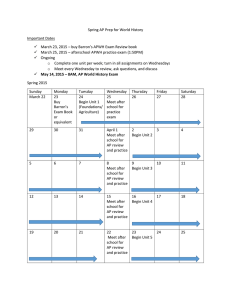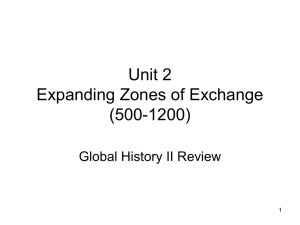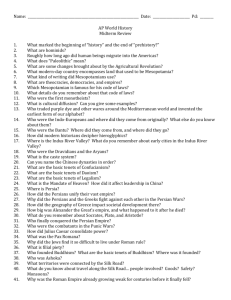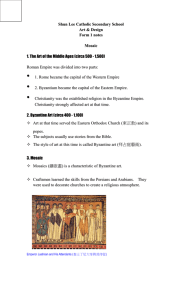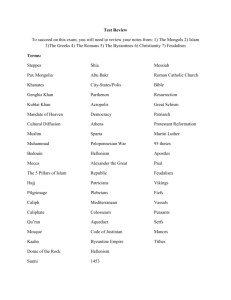AP World History - Miami Beach Senior High School
advertisement
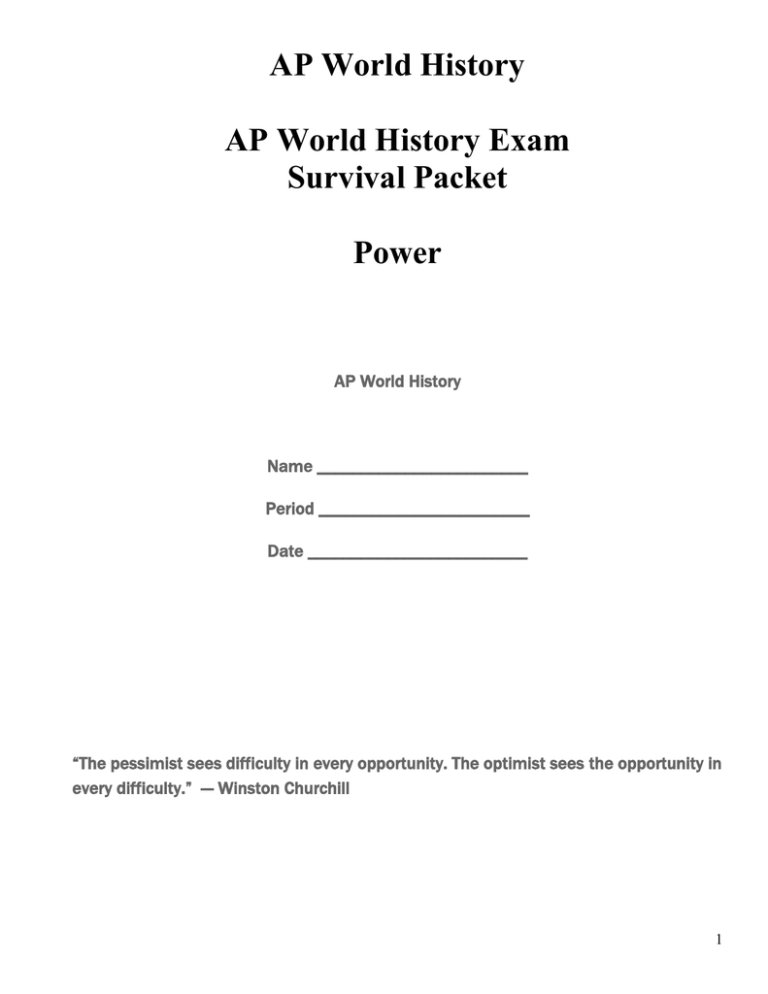
AP World History AP World History Exam Survival Packet Power AP World History Name ________________________ Period ________________________ Date _________________________ “The pessimist sees difficulty in every opportunity. The optimist sees the opportunity in every difficulty.” --- Winston Churchill 1 Introduction The study of power as it relates to Global History and Geography is the study of how cultures, ideologies, social movements, and religions often affect others beyond their immediate sphere of influence. The Roman Empire at its height controlled most of the Mediterranean world, extending its influence far beyond its borders. Islam, which started in modern day Saudi Arabia, quickly spread its influence beyond to control much of the same area the Romans had centuries before. In the twentieth century, the ideology of fascism quickly spread out of Italy and Germany to influence most of mainland Europe, mainly through military force. The study of power is often the study of one culture's ideas and values supplanting another's, often through force. During the Age of Exploration, European countries extended their political, social, and economic power to take over, and in many cases destroy, native cultures around the globe. This occurred again in the 19th century, when European countries sought to control others for economic gain. The study of power is often a look at the darker side of human history. Yet, the power of the world's major religions has often been a positive influence on cultures as they provide codes of conduct and morality to work toward in times of strife. The power of Christianity in Europe during the Middle Ages helped to keep society running during those dark times. Political Introduction Political power is often ideas on government and society that have captured the minds of a culture, or at least a certain section of one. Ideologies such as Absolutism, Fascism, and Communism have influenced nations, started wars, and attempted to dominate the world. Political power is also military force, or more correctly put, the will to use such force. Leaders and their nations have since the beginning of history attempted to subjugate others with their way of thinking. While political power has shifted to different places, classes, and ideologies, it is still the thing that makes the world go around. Ideologies Absolutism Absolutism is the complete centralization of power into the hands of one leader. These leaders have few, if any restraints on what they can do within their borders. Absolutism appears in various places throughout history, most notably in India under Akbar the Great in the 16th century, Spain under Charles V and Philip II also in the 16th century, France under Louis XIV in the 17th century, and in Russia under Peter the Great in the late 17th - early 18th centuries. These leaders exercised complete control over all aspects of their populations lives. Reaction to this form of government was often violent, many times resulting in revolutions seeking greater political, social, and economic freedoms. Enlightenment The Enlightenment developed as an extension of the Scientific Revolution. During the Scientific Revolution, Europeans discarded traditional beliefs and began using reason to explain the world around them. While the Scientific Revolution focused on the physical world, the Enlightenment attempted to explain the purpose of government, and describe the best form of it. The most influential Enlightenment thinkers were Thomas Hobbes, John Locke, Voltaire, Baron de Montesquieu, and Jean Jacques Rousseau. 2 The writings of these men has had a tremendous impact on the way government works. Most democratic nations today can trace their ideological origins to the Enlightenment. Political thought in this case is power, in that it changed the behavior of government. Enlightenment ideas also helped to stimulate people's sense of individualism, and the basic belief in equal rights. This in turn led to the Glorious Revolution is Britain, the American Revolution, the French Revolution, and the Latin American Revolutions. Some of these revolutions resulted in government based upon the ideas of the Enlightenment. Elsewhere, a few monarchs retained absolute control of their countries while also enacting reform based on Enlightenment ideas. These monarchs are called Enlightened Despots. In Austria, Maria Teresa and her son Joseph II both introduced reforms based on Enlightenment ideas. They reduced the tax load on the peasants, provided free education, and ended censorship in their empire. In Russia, Catherine the Great introduced similar reforms. She enacted laws for religious toleration and free education, and also sought the advice of nobles and peasants in the running of government. However, these reforms seldom outlived the monarchs who had enacted them. Communism Karl Marx was a German socialist during the 19th century who co wrote a book with another German socialist by the name of Friedrich Engels. The book was called The Communist Manifesto, and put forth the new political ideology of scientific socialism, commonly referred to as communism. Marx and Engels believed their theory to be based on scientific principals and the study of history. They state that human life has consisted of a struggle between the people who have economic wealth, and those who do not. The people who have, called the bourgeoisie, are always in power and use the "have nots", called the proletariat, to stay there. Marx and Engels predicted that capitalism would make the proletariat poorer, which would result in a revolution. They predicted an end to capitalism and the creation of a classless society where all had what they needed. Communist revolutions occurred throughout as a result of this ideology. Most notably, Russia and China became communist states replacing long standing monarchies. However, communism did not developed as Marx and Engels predicted. Instead, most communist countries develop into totalitarian regimes, with a small, elite class of people running everything. Fascism Fascism is totalitarian rule that is imperialistic, nationalistic, and anti-communist. The anti-communist part is interesting as both regimes share many of the same ideas. Fascism appeared in Italy and Germany after World War I as both countries struggled with political and economic ruin. Benito Mussolini in Italy and Adolf Hitler in Germany used this new ideology to gain power and control over their countries. Their rise in power resulted in the greatest war in human history, World War II, as both countries had imperialistic ambitions. In the end, only the combined strength of the United States, Great Britain, and the Soviet Union, were able to defeat the Fascists. 3 Fascism and Communism Fascism rule by dictator limited capitalism In Common censorship use of terror & violence strong military state control of economy extreme nationalism Communism ruled by the Communist Party command economy Modern Democracy The evolution of modern democracy is really a study in the evolution of British democracy and the political thoughts of the Enlightenment thinkers. Since this time, modern democratic government has become the goal of most peoples around the world. Modern democracies operate under the principals of human rights and freedoms, limited government, and participation in government. While practiced in many parts of the world, truly free democracies only exist in a few countries, such as Great Britain, the United States, Canada, New Zealand, Australia, as well as others. Economic Introduction Economic power is often political power achieved through economic means. For example, refusing to trade with a country until it changes some aspect of its culture or government. Throughout the 1970s and 1980s, many countries around the world refused to deal economically with South Africa until Apartheid was repealed, which occurred in the early 1990's. In other cases, economic power is the ability to affect the lives of others through withholding trade, or the raising of prices on goods. The oil crisis of the 1970's is an example of this point. In any case, economic power is often needed to adequately express political or social power. The golden rule often applies, "He with the most gold, rules." Interdependence Interdependence is the reliance of people on goods, resources, and knowledge from other parts of the world. This interaction is mutually beneficial and most often takes the form of trade and cultural diffusion. Exchanges of this type occurred throughout the ancient Middle East, along the Silk Road from China, and between great civilizations, such as the Byzantine and the Islamic Empires. The economic power these countries control was significant, as many could not survive without this trade. Countries like China could negatively affect the lives of people as far away as Europe through trade. However, because of the interdependent nature of this power, if the people of Europe failed to purchase Chinese goods, the same affects in reverse could be achieved. Interdependence continues to grow today due to rapid exchange of ideas, goods, and services through advanced communications. An example of interdependence today is Great Britain importing American autos, Indian tea, and oil from the Middle East. In 1960, the Organization of Petroleum Exporting 4 Countries was formed by Iraq, Iran, Kuwait, Saudi Arabia, and Venezuela. Their goal was to control the oil industry by setting prices and production levels. Control of the majority of the world's oil supply has given OPEC significant power. In 1973, OPEC stopped the sale of oil to certain countries, namely the U.S.. This caused a major slow down of many western nation's economies, and made them realize how dependent they were on foreign oil. This continues today with OPEC limiting production of oil, which in turn causes gas prices to soar. Global Economies The Global North, consisting of North America, Western Europe, Japan, and Australia are industrialized nations with high standards of living and a high literacy rate. The Global South consists of developing nations in Asia, Africa, and South America, many of which were former colonies during European Imperialism. These post colonial nations face low literacy rates, massive unemployment, little to no industrialization, and are generally economically dependent on their former colonial masters. The Global North controls most of the world's economic power, while much of the world's natural resources and 3/4's of its population reside in the Global South. This results in the dependence of the South on the North for capital for growth, finished goods, and food. The North often exploits the South for cheap labor and raw materials. Regional Cooperation: Many nations have linked their economies officially by joining cooperatives or through treaties. The European Union is an example of a group of nations working to unify economically. The EU has worked for years to lower tariffs and institute free trade among its member nations. Recently, many of its nations switched to a single currency, the Euro. The North American Free Trade Agreement (NAFTA) is another example of nations attempting to lower trade barriers and link their economies. Regional cooperation extends the power of countries that otherwise would not be on the world stage. Banking: Industrialized nations make loans to developing nations to help with modernization efforts. As the world economy slowed in the 1980s, many of these nations were unable to keep up with the loan payments. The International Monetary Fund negotiated deals between these countries for repayment. In exchange for lower interest rates, many developing nations were forced to accept free market principles. This is an example of economic power having political consequences. Pacific Rim The Pacific Rim is a group of nations in Asia and the Americas that border the Pacific Ocean. Economic interest in this area has grown dramatically since the end of World War II. Many predict that the Pacific Rim will come to dominate world economics due to their large market size. Many nations in this area, including, Taiwan, Singapore, Hong Kong, and South Korea (known as the Asian Tigers) have experienced rapid economic growth and prosperity due to industrialization. These nations were also aligned both politically, and economically with the West throughout the Cold War. United Nations Besides its political and social functions, the United Nations also has a number of economic functions. These mainly concern the promotion of economic cooperation among member nations, ending poverty and famine, and providing disaster relief. In the years since its inception, the U.N. has helped many countries and millions of people economically. In the 1960's the U.N. sent relief to Biafra during the Nigerian civil war. This action saved million from starvation. The U.N. has also relieve famine in Somalia, Rwanda, Ethiopia, and Sri Lanka. Through special agreements with other independent agencies, the U.N. continues to promote economic growth and stability throughout the world. 5 International Monetary Fund The International Monetary Fund is an international organization established to promote monetary cooperation, exchange stability, and economic growth. The IMF also works to lower unemployment and help countries in debt manage their finances. Because of the large debt owed to the Global North from the Global South, many of these countries need the IMF to keep up payments while still attempting to build an independent economy. Recently, their have been calls for the industrial nations to forgive the debt owed by the developing nations of the South. This means they would have a chance to start fresh. So far, this has not occurred. Because of its role in these matters, the IMF wields considerable power. World Bank The World Bank Group is a vast financial resource owned and controlled by its membership of over 180 countries. The purpose of the bank, established in 1944, is to provide loans and economic advice to its member countries. In 2001, the bank provided over 17.3 billion dollars in loans to over 100 different developing nations. These loans, along with good financial advice are intended to bring these developing nations out of poverty and allow them to become economically independent. The World Bank Group also wields considerable power due to the amount of money they have at their disposal. Social Belief Systems The power of a belief systems is their ability to govern a culture and sometimes to spread and affect other cultures. Belief systems also can express power through their memberships. There have been times throughout history when religious leaders have called on their faithful to perform some service, and the faithful responded. Moral Code Many belief systems provide a moral code of behavior that regulate the way a culture will act. Judaism and Christianity follow the Ten Commandments, Islam follows the Quran and Sharia, Hindus obey their Karma and Dharma, Buddhists follow the Eightfold Path, and follows of Confucius believe in the 5 Relationships. The one thing these systems all have in common is a way to regulate behavior. These systems are very powerful in this sense because for many of them, the punishment for disobedience is eternal damnation. Extending Power Many belief systems have expanded beyond their original borders, extending their influence and power at the same time. Buddhism, originally developed in India, is today most prevalent in China, Southeast Asia, and Japan, where it has had great influence on their cultural development. Christianity, begun in present day Israel, was nearly destroyed by an intolerant Roman Empire. Yet, it eventually became the official religion of the Romans, and has since spread across the world having tremendous influence everywhere is has evolved. One of the most striking extensions of religious power are the crusades launched by the Roman Catholic Church in Europe against the Muslims in the Middle East to regain the Holy Lands. The Crusades began as a result of the Seljuk Turks take over of the Holy Lands from the Byzantine Empire in the early 11th century. The Byzantine emperor asked Pope Urban II of the Roman Catholic Church to help regain these lands for the Christians. The Pope agreed, and over the course of two centuries, thousands of men and women left western Europe to fight to regain these lands. After an initial 6 success, which resulted in the take over of Jerusalem, the rest of the crusades ultimately failed in their original purpose. However, the Church did show the great extent of their power over the people of Europe. Islam is another belief system with humble beginnings, that has expanded in terms of territory, number of believers, and power. Soon after its beginnings, Islamic peoples quickly conquered neighboring territories and built an impressive empire. They were able to do this because of the unifying power of Islam, and tolerant Islamic rulers. Today, Muslims are found all over the world, with most living in the Middle East. There, they have tremendous economic and political power in many places and continue to be an influence on world events. United Nations Besides its political and economic functions, the United Nations also has a number of social functions. These functions primarily concern the protection and advancement of human rights. The United Nations published the Universal Declaration of Human Rights, stating that all people are free and equal regardless of "race, color, sex, language, religion, political or other opinion, national or social origin, property, birth or other status." Since this time, efforts have been made to end human rights abuses around the world. The U.N. takes actions against human rights abuses through economic sanctions and military force in the form of peacekeeping missions. Besides their work with human rights, the U.N. also promotes the general welfare of people around the world through organizations such as the World Health Organization (WHO) and United Nations Children's Fund (UNICEF). These organizations deliver food and medical supplies to areas in need to address the needs of poverty and famine. Empires The Hellenistic World The Hellenistic world began under the leadership of Alexander the Great, who conquered an empire stretching from the Greek mainland all the way to the Indus River Valley. Hellenistic society was a blending of Greek, Egyptian, Persian, and many other cultures that gave rise to advancements in math, science, art, and literature. The influence of power in this case is one of culture. Alexander died young, and his empire was divided between his strongest generals. Yet, the cultural and intellectual achievements live on in both the Roman Empire and Byzantine Empire, as well as cultures spread from the Mediterranean to the Indus River Valley. Hellenistic World 7 The Roman Empire The Roman Republic was founded in 509 BCE. The government was run by elected officials called Senators, who were chosen from the upper class called Patricians. The lower class, Plebeians, made up the majority of the population and were generally farmers, artisans, and merchants. By 270 BCE, Rome controlled all of Italy. They also soon conquered Carthage, Macedonia, Greece, and parts of Asia Minor. This expansion led to civil war and the end of the Republic when Julius Caesar took power in 48 BCE. After his murder, Caesar's grandnephew, Augustus, became Emperor, turning Rome into an Empire. Rome extended it power throughout the Mediterranean world for about the next 500 years. Roman territories adopted Roman culture, the Latin language and alphabet, and supported Rome through taxes and trade. Roman Empire 8 The Byzantine Empire When the Roman Empire divided under the Emperor Diocletian in the late 200s CE. The Eastern half of the empire became known as the Byzantine Empire, as its new capital was built on the site of the old Greek city Byzantium. When the western half was overrun in the late 5th century CE, the Byzantine Empire became supreme. The Byzantine Empire preserved much of the Greco-Roman culture, and helped spread it across a vast region. Maintaining control over much of the old Roman territories, the Byzantine Empire also spread its power and influence into new areas, such as Russia. Byzantine missionaries spread the Orthodox Christian religion to Russia, and also adapted the Greek alphabet to provided the Slavic speaking peoples a written language called Cyrillic, after the monk Cyril who helped create it. Russia and Eastern Europe also adapted art and literature from the Byzantines, as well as architecture. In return, these areas became important trading partners for the Byzantines. Byzantine Empire The Islamic Empire Islam began in the Arabian Peninsula in the early 7th century CE. It quickly spread throughout the Middle East before moving across North Africa, and into Spain and Sicily. By the 13th century, Islam had spread across India and Southeast Asia. The reasons for the success of Islam, and the expansion of its empire, can be attributed to the strength of the Arab armies, the use of a common language, and fair treatment of conquered peoples. Arab armies were able to quickly conquer territory through the use of advanced tactics and the employment of horse and camel cavalry. Islamic rulers were very tolerant of conquered peoples, and welcomed conversion to the Islamic faith. All Muslims must learn Arabic, so they can read the Quran, the Islamic holy book. This common language helped to unite many different ethnic groups within the Islamic empire. It also made possible the easy exchange of knowledge and ideas. This resulted in a golden age under the Abbassid Dynasty, which ruled from the mid 8th century until the mid 13th century. Under the Abbassids, Islamic culture became a blending of Arab, Persian, Egyptian, and European 9 traditions. Islam did not lose power in Spain until the end of the 15th century during the Reconquista. Throughout the Middle East and Northern Africa, while the Islamic Empire of the Abbassid's disappeared, the faith of Islam, and government and society based thereon remain to this day. The Mongol Empire The Mongols were a nomadic tribe of herders who lived in Central Asia. Under their greatest leader, Genghis Khan, they conquered the world's largest empire to date. The Mongols ruled, at one time or another, Russia and parts of Eastern Europe, China, India, and parts of the Middle East. Mongol Empire Yet, little of Mongol culture remained after they have left a region. Their power was one of control. During the Pax Mongolia, or Mongol Peace, global trade expanded due to the political stability provided by Mongol rulers. Silk Road trade flourished as goods and ideas, such as gunpowder, porcelain, and the technology of papermaking were traded with the west. The Pax Mongolia was a time of trade and cultural diffusion Little or no Mongol legacy exists today. 10 Imperialism Imperialism occurs when a strong nation takes over a weaker nation or region and dominates its economic, political, or cultural life. Old Imperialism Old Imperialism occurs in the 15th through 18th centuries in Africa, India, the Americas, and parts of Asia. The motives were the same for most areas, the establishment of lucrative trade routes. Various European countries dominated these trades routes at one time or another, and some countries, such as Great Britain and Spain, came to dominate entire countries. New Imperialism New Imperialism was practiced by European nations and Japan throughout the 1800s and early 1900s. In every case, a nation would experience industrialization prior to practicing imperialism on a foreign nation or region. This is due to the nearly insatiable demand for cheap raw materials and the need for markets to buy manufactured goods. Causes of Imperialism Economic Motives The Industrial Revolution created an insatiable demand for raw materials and new markets. Nationalism European nations wanted to demonstrate their power and prestige to the world. Balance of Power European nations were forced to acquire new colonies to achieve a balance with their neighbors and competitors. White Man's Burden The Europeans’ sense of superiority made them feel obligated to “civilize the heathen savages” they encountered. Results In the short-term, imperialism was a very profitable foreign policy which came at the expense of the foreign regions where it was being practiced. Cultural diffusion also occurred, leading to an exchange of ideas between the West and the East. For example, European methods of education were adopted, leading non-Europeans to study ideas of liberty and democracy embraced during the Enlightenment and various political revolutions. This exchange eventually led to the demise of imperialism and colonialism throughout the world after World War Two. 11
